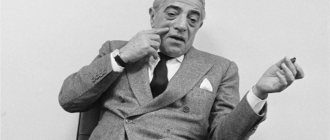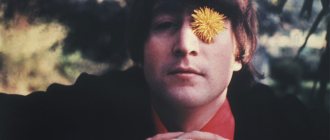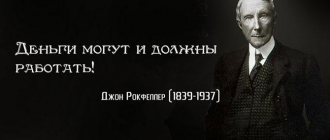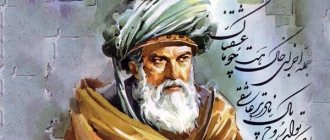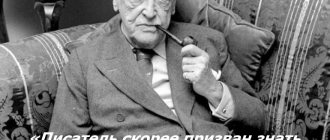John Locke short biography (1632 - 1704)
Locke John quotes.
English philosopher. Born into the family of a small landowner. He graduated from Westminster School and Oxford University, where he later taught. In 1668, he was elected to the Royal Society of London, and a year earlier he became a family physician, and then the personal secretary of Lord Ashby (Earl of Shaftesbury), thanks to whom he became involved in active political life. Locke's interests, in addition to philosophy, manifested themselves in medicine, experimental chemistry and meteorology. In 1683, he was forced to emigrate to Holland, where he became close to the circle of William of Orange and, after his proclamation as King of England in 1689, returned to his homeland. The theory of knowledge occupies a central place in Locke. He criticizes Cartesianism and university scholastic philosophy. He presented his main views in this area in his work “Essays on the Human Mind.” In it, he denies the existence of “innate ideas”, and recognizes exclusively external experience, consisting of sensations, and internal, formed through reflection, as the source of all knowledge. This is the famous doctrine of the “blank slate”, tabula rasa. The foundation of knowledge consists of simple ideas, excited in the mind by the primary qualities of bodies (extension, density, movement) and secondary ones (color, sound, smell). From the connection, comparison and abstraction of simple ideas, complex ideas (modes, substances, relations) are formed. The criterion for the truth of ideas is their clarity and distinctness. Knowledge itself is divided into intuitive, demonstrative and sensitive.
Locke considers the state as the result of a mutual agreement, but highlights not so much legal as moral criteria for people’s behavior, understanding the “Power of morality and morality” as the main condition for a prosperous state. Moral standards are the foundation on which human relationships are built. This is facilitated by the fact that people’s natural inclinations are directed precisely towards good.
Locke's socio-political views are expressed in his Two Treatises on Government, the first of which is devoted to criticism of the divine basis of absolute royal power, and the second to the development of the theory of constitutional parliamentary monarchy. Locke does not recognize the absolute monistic power of the state, arguing for the need for its division into legislative, executive and “federal” (dealing with the external relations of the state) and allowing the right of the people to overthrow the government.
In religious matters, Locke takes the position of religious tolerance, which lies at the basis of religious freedom. Although he recognizes the necessity of divine revelation due to the finitude of the human mind, he also has a tendency toward deism, which manifests itself in the treatise “The Reasonability of Christianity.”
About the natural state
[…] 4. To properly understand political power and determine the source of its origin, we must consider in what state of nature all men find themselves, and that is a state of complete freedom in respect to their actions and in respect of the disposal of their property and person in accordance with what they want. what they consider suitable for themselves within the limits of the law of nature, without asking the permission of any other person and without depending on anyone's will. It is also a state of equality in which all power and all jurisdiction are reciprocal—no one has more than another. Nothing is more evident than that beings of the same breed and species, at their birth without distinction receiving the same natural advantages and using the same faculties, must
148 Section 1. METHODOLOGICAL PROBLEMS IN THE HISTORY AND THEORY OF POLITICAL SCIENCE
We must also be equal among ourselves without any subordination or suppression, unless the Lord and Ruler of them all, by some manifest manifestation of his will, places one above the other, and invests him by a clear and definite appointment with an indisputable right to dominion and supreme power.
Childhood and youth
The future philosopher was born in 1632 in the small village of Wrington, located near the county of Bristol.
The boy's father, John Locke, was one of the best lawyers in the area, who lived in prosperity.
John Sr. was a freedom-loving man; at the time when England was ruled by Charles I, he served as a captain in Cromwell's army at Parliament. During the revolution, Locke Sr., due to unprecedented generosity, lost all his savings, giving money to the needy. Thus, the father taught his son that he should try to live for society.
Portrait of John Locke
From the biography of the scientist’s mother, all that is known is that her maiden name is King. More information about the woman who raised the philosopher did not reach his contemporaries.
The boy grew up in an oppositional family; neither his father nor his mother supported the absolute monarchy, nor did they support the regime of the dominant Anglican Church.
John's parents raised their son, each of them made their own contribution to the boy's development. Thus, from his father, Locke the Younger inherited a love of freedom and contempt for small everyday things, and from his mother, the philosopher inherited piety.
The woman was afraid of losing her children, because John’s brother died in infancy due to poor health. Therefore, Locke's mother lived in eternal fear of God and constantly prayed.
Young John Locke
The boy was raised religiously and strictly, according to Puritan rules. For the most part, the boy was taken care of by his father, who developed his own method, which John Jr. later praised.
John Sr. kept his son at a great distance from him and in complete obedience. Then he slowly allowed the boy to approach, and the menacing tone and orders turned into everyday advice. Gradually, the “boss” and the “subordinate” became equal to each other and they were bound by strong friendship.
Locke grew up as a gifted and well-read boy. His father's friend, Colonel Alexander Popham, advised John Jr. to be sent to Westminster School.
Robert Boyle
The philosopher's biographers say without exaggeration that Locke was the best student at school: the boy treated all subjects diligently and diligently.
In 1652, Locke entered the University of Oxford, where he studied medicine, Greek and Latin languages, literature, etc. The young student was taught natural science by Robert Boyle himself. During his university years, Locke began to become interested in the philosophy of the mathematician Rene Descartes, who became the beginning of the worldview that the student developed.
Rene Descartes
John Locke's interest was aroused by his teacher and mentor Robert Boyle.
Descartes taught Locke an aversion to empty, abstruse words that carry no meaning; throughout his life, John believed that brevity is the sister of talent.
Also, the future philosopher began to adhere to the teachings of John Wilkins, who was passionate about science, and the scientist Richard Lowe instilled in the young man a love of medicine.
Death
Locke spent the last years of his life in the country house of an acquaintance, Damerys Masham, who stood in for his daughter. The woman admired the philosopher, so Locke's moral teachings dominated her family.
John Locke's grave
In old age, Locke lost his hearing, which made him very sad, because he could not hear his interlocutors.
The philosopher died of asthma on October 28, 1704 at the age of 72. The scientist was buried near his last place of residence.
On the emergence of political societies
95. Since men are, as has already been said, by nature free, equal and independent, no one can be removed from this state and subjected to the political power of another without his own consent. The only way in which any one gives up his natural freedom and puts on the bonds of civil society is by agreement with other people to unite in a community in order to live comfortably, safely and peacefully together, in the quiet enjoyment of their property and being in greater security than anyone outside the community. Any number of people can do this, since there is no prejudice to the freedom of other people, who, as before, remain in a natural state of freedom. When any number of people have thus agreed to create a community or state, they are thereby united and constitute a single political body in which the majority has the right to act and decide for the rest. 96. After all, when any number of people created a community with the consent of each individual, they thereby made this community a single organism, having the right to act as a single organism, which can only happen by the will and decision of the majority. For what puts a community into action is only the consent of the persons composing it, and since that which is one whole must move in one direction, it is necessary that this whole should move where it is drawn by the great force which constitutes the consent of the majority: otherwise it is unable to act as a single whole or continue to remain united.
150 Section I. METHODOLOGICAL PROBLEMS IN THE HISTORY AND THEORY OF POLITICAL SCIENCE
a whole, unified community, as all the individuals united in it agreed to; and thus each, by this consent, is obliged to obey the majority. And this is why we see that in legislative assemblies invested with power by the force of positive laws, in those cases where the positive law that invested them with power does not indicate a number, the action of the majority is considered the action of the whole and, of course, determines the power of the whole, which according to it possesses the law of nature and reason. 97. And thus every man, having agreed with others to form a single body politic, subject to one government, undertakes to every member of that community the obligation to submit to the decision of the majority and to consider it final; otherwise, this original contract, by which he, together with others, entered into one society, will not mean anything and will not be a contract at all, if this person remains free and has no other bonds than those that he had . being in a natural state. After all, what would any agreement look like then? What new obligation will this be if a person is bound by any regulations of society only insofar as he himself considers it convenient and has given his consent to it? For then he will still enjoy the same freedom as he enjoyed before this treaty, or as a man in a state of nature enjoys, who can motivate himself and consent to any action if he considers it suitable for himself.
Personal life
In reclusion and loneliness, John Locke surpassed even Kant. It would seem that the great philosopher is a worldly man who loves life. However, if Kant acquired a house and a servant by the end of his life, then Locke had neither one nor the other. John was a homeless man who spent his entire life in other people's houses as a teacher, an example is the story of Anthony.
John did not set himself the goal of acquiring a central activity; all his actions were fragmentary. He practiced medicine whenever anyone asked him to, studied politics whenever possible, etc.
John Locke was lonely
Pious John Locke did not betray the importance of the material world, but prepared for the future life, which, judging by the Holy Scriptures, awaits a person in the afterlife. This can be explained both by Locke’s piety and his poor health. Sometimes sick people live a long time, but are constantly preparing for death, evaluating themselves as guests in this world.
The scientist did not have a wife or children. Locke tried to combine two opposing concepts - religion and science.
Quotes
- “Every passion has its origin in pleasure or pain.”
- “There is hardly anything more necessary for knowledge, for a quiet life and for the success of any business than a person’s ability to control his thoughts.”
- “True courage is expressed in calm self-control and in the calm performance of one’s duty, regardless of any calamity or danger.”
- “Twenty deeds can be forgiven sooner than one violation of the truth.”
- “In a poorly educated person, courage becomes rudeness...”
Biography
In the 17th century, the first signs of freedom appeared in England. When theology and conclusions of Aristotle were taught in universities, medieval philosophy was forgotten and natural sciences took their place. Also, the 17th century for England was a civil war, marked by a gradual transition from an absolute monarchy to a constitutional one. At this time, the great English philosopher John Locke was born, whose works became the basis of universal philosophical practice.
Pedagogy
After brilliantly graduating from Oxford University, Locke taught ancient languages for a couple of years, but soon left this position, accepting the offer of Earl Anthony Ashley Cooper of Shafstbury. When Anthony was seriously ill, John Locke made the correct diagnosis. The grateful count invited John to work as a family doctor and raise two boys.
At that time, Locke writes letters to his friend Clark and expresses his opinion about education. Edward diligently collected the philosopher’s letters, which served as the basis for the pedagogical work “Thoughts on Education.”
John Locke Statue
John was sure that a person’s actions depend not on his own perception, but on upbringing, which develops a person’s character, will and moral discipline. Moreover, according to Locke, physical education should develop simultaneously with spiritual education. The physical is to develop hygiene and health, and the spiritual is to develop morality and dignity.
The thoughts expressed in letters to Clark reflect how Locke was raised by his father:
- Development of the body, adherence to strict discipline, daily routine and eating simple food;
- Developmental exercises and games;
- The child must go against desire and do what reason dictates and what does not contradict morality;
- From an early age children should be taught graceful manners;
- Physical punishment of a child takes place only with systematic disobedience and impudent behavior.
